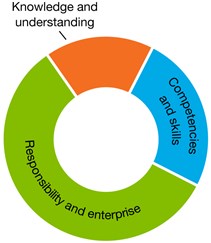Explore content
Typically, by the end of Year 6, students:
Recognise emotions
explain how the appropriateness of emotional responses influences behaviour
Recognise personal-qualities-and-achievements
describe the influence that personal qualities and strengths have on their learning outcomes
Typically, by the end of Year 6, students:
Communicate effectively
identify and explain factors that influence effective communication in a variety of situations
Negotiate and resolve conflict
identify causes and effects of conflict, and practise different strategies to diffuse or resolve conflict situations
Typically, by the end of Year 6, students:
Work independently and show initiative
assess the value of working independently, and taking initiative to do so where appropriate
Become confident, resilient and adaptable
devise strategies and formulate plans to assist in the completion of challenging tasks and the maintenance of personal safety
Appreciate diverse perspective
explain how means of communication differ within and between communities and identify the role these play in helping or hindering understanding of others
Contribute to civil society
identify a community need or problem and consider ways to take action to address it
Work collaboratively
contribute to groups and teams, suggesting improvements in methods used for group investigations and projects
Make decisions
identify factors that influence decision making and consider the usefulness of these in making their own decisions
Develop leadership skills
initiate or help to organise group activities that address a common need


